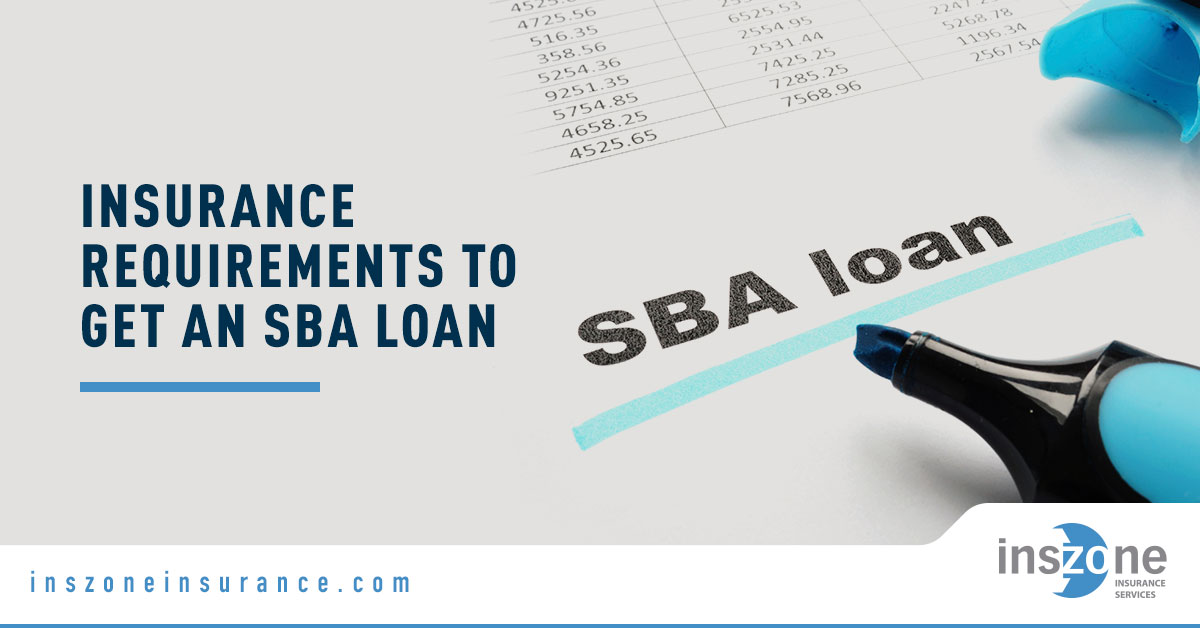Securing a Small Business Administration (SBA) loan can provide the capital needed to launch, grow, or recover your business. However, to qualify for approval, you must meet specific eligibility and insurance requirements set by both the SBA and participating lenders.
From SBA life insurance requirements to property and hazard coverage, insurance plays a key role in protecting both your business and your lender’s investment. Understanding these rules ensures a smoother approval process and safeguards your assets once funding is secured.
What Insurance Is Required for an SBA Loan?
Every SBA loan requires certain types of insurance coverage to protect the loan’s collateral and ensure repayment. According to the SBA Standard Operating Procedure (SOP 50 10 5 (B)), businesses must maintain insurance coverage that aligns with the size, risk, and purpose of the loan.
Typical SBA loan insurance requirements include:
- Life Insurance for SBA Loan: If the success of your business depends heavily on one or two individuals—such as the owner or key executives—you must carry life insurance. The policy amount and term must match the loan size and duration, and the lender must be listed as the collateral assignee.
- Hazard Insurance for SBA Loan: If you use property as collateral, you must maintain hazard insurance that covers the property’s full value.
- SBA Flood Insurance Requirements: If your collateral is in a federally designated flood zone, a flood insurance policy covering the property’s full value is mandatory.
- General Liability Insurance SBA Loan: Required for most businesses to protect against third-party injury or property-damage claims.
- Workers’ Compensation: Mandatory if you have employees, ensuring compliance with state law and lender requirements.
Failing to maintain required coverage can jeopardize your loan agreement or delay approval.
Do I Need Business Insurance to Qualify for an SBA Loan?
Yes. Maintaining business insurance for SBA loan approval is essential. Lenders want to know that your assets—and their collateral—are protected from unexpected losses.
Typical qualifications include:
- Operating as a legal, for-profit business physically located in the U.S.
- Meeting SBA size standards based on your industry.
- Demonstrating creditworthiness and the ability to repay.
- Proving that your business cannot secure similar credit on reasonable terms elsewhere.
Beyond these, SBA lenders often require proof of adequate insurance to mitigate the risk of business interruption or asset loss. Depending on your operations, this could include hazard insurance, disability insurance, or product liability coverage.
What Types of Insurance Are Required by the SBA?
The SBA requires borrowers to maintain several types of insurance coverage depending on the nature of their business, loan structure, and collateral. These policies not only protect you from financial loss but also keep your lender’s interests secure.
Common SBA loan coverage types include:
- Life Insurance for SBA Loan: Protects lenders in case a business owner or key person dies before the loan is repaid. The lender is named as the collateral assignee.
- Hazard or Property Insurance: Covers damages from fire, wind, theft, or vandalism for property used as loan collateral.
- Flood Insurance: Required when collateral is in a flood-prone area, meeting SBA flood insurance requirements.
- General Liability Insurance: Shields the business from lawsuits, accidents, and other third-party claims.
- Workers’ Compensation: Provides benefits for employees injured on the job, as mandated by state law.
- Disability Insurance: Recommended for owners whose income directly sustains the business, ensuring loan repayment in case of illness or injury.
For California and other disaster-prone states, additional coverage—such as earthquake or wildfire insurance—may be required under SBA hazard insurance guidelines.
How Does Insurance Affect SBA Loan Approval?
Proper insurance coverage is not only a lender safeguard but also a sign of responsible risk management. Without the right policies in place, your lender may reduce your loan amount, delay funding, or issue a “repair”—a deduction from SBA’s loan guarantee payment caused by missing insurance.
Here’s why insurance directly impacts SBA loan approval:
- Risk Mitigation: Insuring collateral (like equipment or property) ensures both you and the lender are protected if damage occurs.
- Business Continuity: If insured assets are damaged, coverage helps you repair or replace them quickly, avoiding income loss.
- Compliance: Meeting all SBA loan insurance requirements—including hazard, flood, and life insurance—keeps you in good standing with your lender.
- Peace of Mind: Knowing your business, employees, and property are protected lets you focus on growth, not unexpected setbacks.
Failing to secure or maintain required insurance can result in loan default or denial. Always confirm your lender’s insurance checklist before closing.
Protect Your Business and Secure SBA Loan Approval
Every SBA loan requires comprehensive insurance coverage tailored to your business type and collateral. At Inszone Insurance, we specialize in helping entrepreneurs and small-business owners meet SBA loan coverage types—from life insurance for SBA loans to hazard and flood insurance—to ensure fast, compliant loan approvals.
Talk to an Inszone commercial insurance specialist today to review your SBA loan insurance requirements and secure the coverage your lender expects.
(Sources: U.S. Small Business Administration SOP 50 10 5, SBA Disaster Loan Assistance Program, FEMA Flood Insurance Requirements, California Department of Insurance – Small Business Coverage Resources.)





